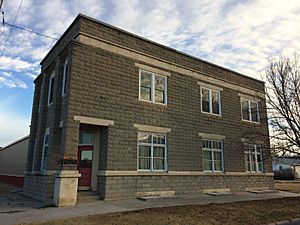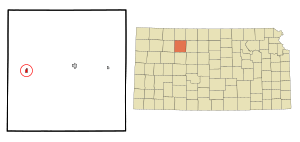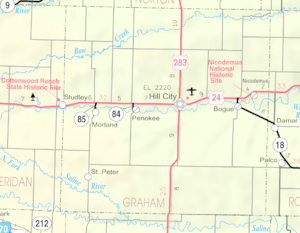Morland, Kansas facts for kids
Quick facts for kids
Morland, Kansas
|
|
|---|---|

Morland Community Foundation building (2017)
|
|

Location within Graham County and Kansas
|
|

|
|
| Country | United States |
| State | Kansas |
| County | Graham |
| Founded | 1884 (Fremont) |
| Incorporated | 1906 (Morland) |
| Area | |
| • Total | 0.48 sq mi (1.24 km2) |
| • Land | 0.48 sq mi (1.24 km2) |
| • Water | 0.00 sq mi (0.00 km2) |
| Elevation | 2,303 ft (702 m) |
| Population
(2020)
|
|
| • Total | 115 |
| • Density | 240/sq mi (92.7/km2) |
| Time zone | UTC-6 (CST) |
| • Summer (DST) | UTC-5 (CDT) |
| ZIP code |
67650
|
| Area code | 785 |
| FIPS code | 20-48275 |
| GNIS ID | 2395402 |
Morland is a small city located in Graham County, Kansas, in the United States. In 2020, the city had a population of 115 people. It is a quiet community in the western part of Kansas.
Contents
History of Morland: How the City Got Its Name
The area where Morland is now was first settled in 1884. It was originally called Fremont. This name honored John C. Fremont, a famous explorer.
However, there was another town in Kansas already named Fremont. To avoid confusion, the name was changed to Kalula in 1888. A few years later, in 1892, the name was changed again to Morland. This final name was chosen to honor a person who worked for the railroad.
Geography: Where Morland is Located
Morland is a small city in terms of its size. According to the United States Census Bureau, the city covers a total area of about 0.47 square miles (1.24 square kilometers). All of this area is land, meaning there are no large lakes or rivers within the city limits.
Population: Understanding Morland's People
Morland's population has changed over the years. Here's a look at how many people have lived in the city during different census counts:
| Historical population | |||
|---|---|---|---|
| Census | Pop. | %± | |
| 1910 | 237 | — | |
| 1920 | 296 | 24.9% | |
| 1930 | 385 | 30.1% | |
| 1940 | 356 | −7.5% | |
| 1950 | 287 | −19.4% | |
| 1960 | 317 | 10.5% | |
| 1970 | 300 | −5.4% | |
| 1980 | 223 | −25.7% | |
| 1990 | 234 | 4.9% | |
| 2000 | 164 | −29.9% | |
| 2010 | 154 | −6.1% | |
| 2020 | 115 | −25.3% | |
| U.S. Decennial Census | |||
2020 Census: A Closer Look at Morland's Population
In 2020, the 2020 United States census counted 115 people living in Morland. There were 73 households and 40 families. Most of the people living in Morland were white.
About 12% of the population was under 18 years old. Around 28% of the people were 65 years old or older. The average age in Morland was about 55 years. This means it is a community with many older adults.
2010 Census: Morland's Community Snapshot
The census in 2010 showed that 154 people lived in Morland. There were 77 households in the city. Most residents were white, with a small percentage identifying as Native American or from two or more races.
About 21% of households had children under 18. Many households were married couples living together. The average household had 2 people. The average age in the city was 51 years.
Education: Schools and Sports in Morland
The public schools in Morland are part of the Graham County USD 281 school district. This district used to be known as Hill City USD 281. In 2002, the Morland USD 280 school district joined with it.
The schools in Morland eventually closed due to school unification. Before they closed, the Morland High School had a mascot: the Morland Tigers. The Morland Tigers were very successful in volleyball. They won the Kansas State High School class 1A volleyball championship twice, in 1974 and 1975.
See also
 In Spanish: Morland (Kansas) para niños
In Spanish: Morland (Kansas) para niños
 | Aaron Henry |
 | T. R. M. Howard |
 | Jesse Jackson |

